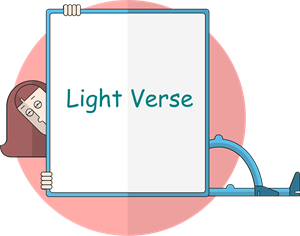
PUMPA - SMART LEARNING
எங்கள் ஆசிரியர்களுடன் 1-ஆன்-1 ஆலோசனை நேரத்தைப் பெறுங்கள். டாப்பர் ஆவதற்கு நாங்கள் பயிற்சி அளிப்போம்
Book Free DemoLight verse is a kind of poetry that contains trivial, playful, or frivolous themes. The primary aim of such poetry is to entertain its readers.

Characteristics of a light verse:
- The poems are usually brief.
- Their target audience are children.
- The language is simple, and the poems are easy to read and understand.
- The subject/theme are mostly nonsensical and cannot be taken seriously.
- The poem often contains wordplay such as puns, striking rhyme, and heavy use of alliteration.
- Sometimes, the poems might also contain words coined by the poet. The terms often seem senseless when used outside the context.
Various writers explored and championed light verse. Some of the famous exponents were Lewis Carroll, W. H. Auden, Edward Lear, Alexander Pope, and Shel Silverstein.
The term ‘light verse’ is also used to identify the poetic forms such as nonsense poetry, mock-epic, etc.
Read more about light verse here.
Example:
The following example of a light verse is an extract from Edward Lear's "The Owl and the Pussy Cat"**:
The Owl and the Pussy-cat went to sea
In a beautiful pea-green boat,
They took some honey, and plenty of money,
Wrapped up in a five-pound note.
The Owl looked up to the stars above,
And sang to a small guitar,
"O lovely Pussy! O Pussy, my love,
What a beautiful Pussy you are,
You are,
You are!
What a beautiful Pussy you are!"
In a beautiful pea-green boat,
They took some honey, and plenty of money,
Wrapped up in a five-pound note.
The Owl looked up to the stars above,
And sang to a small guitar,
"O lovely Pussy! O Pussy, my love,
What a beautiful Pussy you are,
You are,
You are!
What a beautiful Pussy you are!"

Edward Lear's illustration of "The Owl and the Pussy Cat"
Important!
Click here to read the rest of the poem "The Owl and the Pussy Cat".
Let us see how the poem "Whatif" by Shel Silverstein is a form of light verse.
Last night, while I lay thinking here,
Some Whatifs crawled inside my ear
And pranced and partied all night long
And sang their same old Whatifsong:
Whatif I’m dumb in school?
Whatif they’ve closed the swimming-pool?
Whatif I get beat up?
Whatif there’s poison in my cup?
Whatif I start to cry?
Whatif I get sick and die?
Whatif I flunk that test?
Whatif green hair grows on my chest?
Whatif nobody likes me?
Whatif a bolt of lightning strikes me?
Whatif I don’t grow taller?
Whatif my head starts getting smaller?
Whatif the fish won’t bite?
Some Whatifs crawled inside my ear
And pranced and partied all night long
And sang their same old Whatifsong:
Whatif I’m dumb in school?
Whatif they’ve closed the swimming-pool?
Whatif I get beat up?
Whatif there’s poison in my cup?
Whatif I start to cry?
Whatif I get sick and die?
Whatif I flunk that test?
Whatif green hair grows on my chest?
Whatif nobody likes me?
Whatif a bolt of lightning strikes me?
Whatif I don’t grow taller?
Whatif my head starts getting smaller?
Whatif the fish won’t bite?
Whatif the wind tears up my kite?
Whatif they start a war?
Whatif my parents get divorced?
Whatif the bus is late?
Whatif my teeth don’t grow in straight?
Whatif I tear my pants?
Whatif I never learn to dance?
Everything seems swell, and then
The night-time Whatif strikes again!
Whatif they start a war?
Whatif my parents get divorced?
Whatif the bus is late?
Whatif my teeth don’t grow in straight?
Whatif I tear my pants?
Whatif I never learn to dance?
Everything seems swell, and then
The night-time Whatif strikes again!
"Whatifs" by Shel Silverstein follow the tradition of a light verse. One of the striking features of the above poem is that it contains a word that is not a part of the traditional vocabulary. Though there is no word called "whatif", one could see that the poet has used it throughout the poem. The coining and usage of new terms that make very little sense outside the context (of the poem) is a trait of a light verse. Moreover, as expected of a light verse, "Whatifs" is a short poem of \(26\) lines. The subject, on the other hand, is highly frivolous. The context of the poem is that speaker worries over a series of absurd situations that may or may not happen. The questions raised by the speaker are silly, funny, light-hearted, and nonsensical., as seen in the line "Whatif green hair grows on my chest?" The poem, following the attitude of a light verse, is written for children. As a result, the language is simple and straightforward, and the poem is easy to read and understand. Furthermore, it is fun to read as the poem has a exciting rhyme and rhythm, and uses strong alliteration.
Reference: